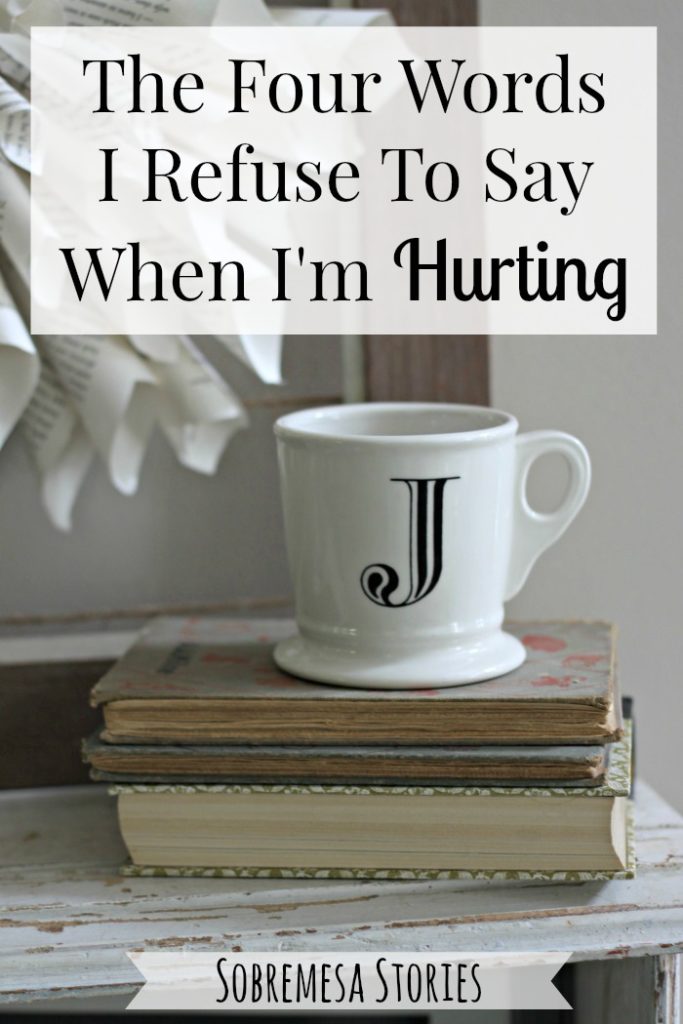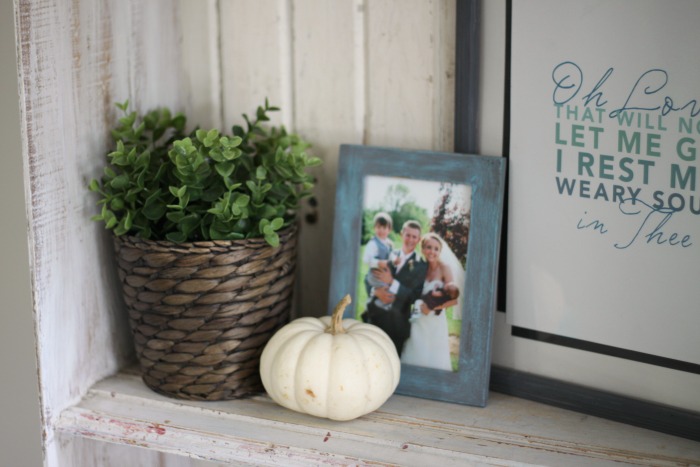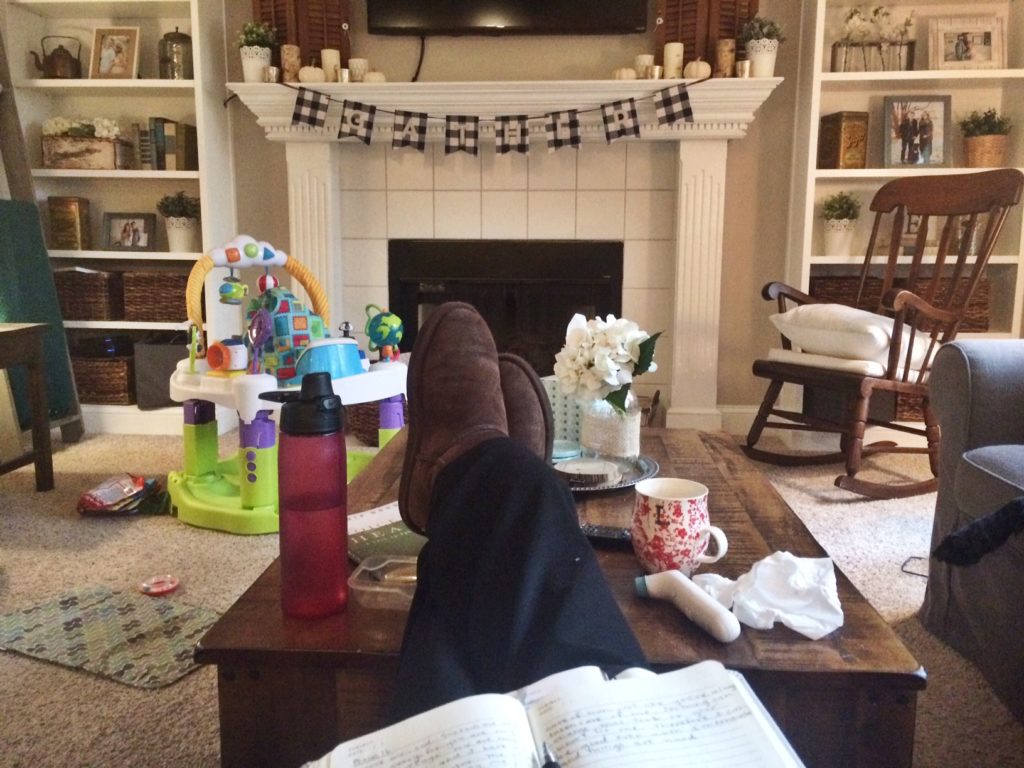I’ve hinted in some recent posts that it’s been a bit of a discouraging season with Caleb, and I’ve wrestled with control, fear, and shame way more than I’d like to admit these last few months. With my husband gone for work all day and long hours with an exhausted baby who just wouldn’t sleep, my heart has felt a bit all over the place.
As I’ve read blog posts and articles by moms in similar places, I’ve been so struck by some of the comments when women share their struggles. I’ve seen some version of a particular phrase over and over and I’ve been thinking about that phrase quite a bit: It could be worse.
“Oh you think it’s bad that your little one won’t nap? My guy is still waking up every two hours at night!”
“You’re discouraged because your kid won’t sleep past 4:45 AM? At least you have a baby and he’s healthy. You should be grateful!”
“You’re feeling lonely in these long days at home? Imagine if your husband was gone in the military or worked nights – then you’d really be miserable!”
These kinds of comments could be made about any struggle – issues at work, in marriage, in trying to start a family, broken relationships, and so much more. But at the heart of all these responses is the same idea: “You think ______ is hard? It could be MUCH worse.”

Why This Is So Hurtful
Let’s assume that the person who says this phrase has a loving, gentle heart and truly wants to give the person sharing their struggles a healthy dose of perspective. Maybe for some people a gentle reminder to be grateful for what they have can be a positive thing. Maybe being reminded that their situation isn’t as bad as it could be helps some people to feel more at peace and prepared to handle the trial they’re going through.
But for me (and maybe for some of you), those statements couldn’t be farther from the truth. Like I shared about in this post on the danger of judging another woman’s feelings, when someone implies that I should feel a certain way because things could be worse, the first place my heart goes is shame.
I feel embarrassed for feeling sadness or discouragement in my current situation. I feel ashamed because I must just be too sensitive or weak to handle what “should” be an easy season (after all, it could be much worse, right?). I feel lost because it seems like there’s no place for my negative feelings so I should just shove them down and forget about them.
When people tell me that I shouldn’t feel negative because my pain isn’t as legitimate as someone else’s, I go to a dark, dark place of shame.
The Unhealthy Practice of Comparing Pain
I can totally understand where the desire to compare and rank our pain comes from. If my pain hurts worse than yours and my situation is worse than yours, then I feel justified in my sadness, anger, and other negative emotions. Comparing my pain to yours and somehow judging mine as more legitimate or painful can take the edge off of my own struggles, even if just for a few minutes.
Over the last year, I’ve come to believe that comparing pain is a dangerous, slippery slope. First, when we compare the pain and suffering of different situations and judge that one person shouldn’t feel pain, we deny the needs and longings built into our humanity. When I tell someone they shouldn’t feel pain because they have something good and their situation could be worse, I essentially tell them that their pain is somehow wrong.
But isn’t it fully human to feel longing and brokenness and hurt, to desire a satisfaction that we’ll never experience on this side of eternity? As long as we are on Earth, we will have unfulfilled longings. A piece of our heart will always ache for something that no marriage, baby, job, or earthly success could ever fulfill. If we believe that this is true, how could we ever tell someone that they SHOULD feel 100% happy and content because they have a certain earthly something?
I refuse to tell someone that their suffering and longings are illegitimate because they should feel content. Our longings and suffering can be a beautiful thing that point us to the Only One who can fulfill us, and I don’t want to discredit that.

The second reason comparing pain is dangerous is that it points to the idea of scarcity – that there’s only so much legitimate pain and suffering to go around. And if only some suffering is legitimate, then it follows that some pains can’t be as real or as worthy of our compassion. How is this perspective ever helpful, my friends? Can I not honor my own suffering as real and challenging, even as I honor yours? Will honoring my own suffering not lead me to view yours with a more empathetic and compassionate heart because I also know what it is to ache?
I love how Brené Brown describes this in her most recent book, Rising Strong. She states that we often look around at the suffering in the world and feel embarrassed for our own seemingly trivial struggles. But ultimately, Brene says that “hurt is hurt, and every time we honor our own struggle and the struggles of others by responding with empathy and compassion, the healing that results affects all of us.”
Comparing our pain to the struggles of others rarely brings us closer to finding healing or growing in real, deep relationships. In its nature, comparison will always separate, judge, and divide. True healing only comes when we take the time to explore our hurts and the hurts of others with love and compassion, believing them to be valuable for understanding our own hearts and the heart of the One who made us.
For these reasons, I refuse to look at my own hurts and dismiss them with the phrase, “Well, it could be worse.” Instead, when I’m going through something hard and my heart hurts (or when a friend approaches me to share their hurts), I want to do these three things. Will you do them with me?
1) Give myself the grace to feel whatever I’m feeling.
I will not be ashamed for my feelings and responses to different challenges. I believe they give me a glimpse into my broken, fragile, human heart and all the ways it reflects the tenderness of the God who made me. I will admit that I am needy and hurting without trying to hide or numb those feelings in some way.
2) Get curious about the things I’m feeling.
Once I’ve given myself the grace to feel things in moments of struggle, I want to get curious about where those feelings come from. Why does this particular struggle impact me so much? What do these feelings tell me about my heart, my beliefs, or my relationships? Do I see any patterns in how I’m responding and what do those patterns tell me about my heart, my beliefs, or my relationships? Does something need to change in how I respond to situations or in my relationships so that things will be healthier?
3) Prioritize my own healing in whatever way I can.
As a mama, I know that my own needs can rarely come first. It’s hard enough to find 30 minutes of alone time, much less time for alllll this fun emotional processing. But I want to practice self-care, to prioritize my own needs and healing at times so I am more able to take care of my family. If my answers to the questions above show a need for a hard conversation with someone, I want to pursue that. If they show a need for clearer boundaries in some area of my life, I want to confidently set those boundaries. I want to value my own heart enough to seek out healing and wholeness.

This year, God is teaching me that until I can admit that my own needs and feelings matter, I won’t be able to grow in my relationships with Him or my relationships with other people.
I need to let myself feel any and all negative feelings, express and explore those feelings without shame, give myself the grace and space to move forward, then do those exact same things for the people in my life.
When I can practice curiosity, compassion, and respect for my own hurt, I will be better able to practice compassion for the suffering of other people. Valuing my own suffering in a healthy way will only lead to more healing and growth in my own heart and in my relationships.
Life may never stop being hard, and each new season may present a variety of new challenges that will stretch me and grow me just like this season has. My prayer is that in the midst of the struggle, I will validate my own feelings and the feelings of others so that I can move away from comparison toward a place of healing. My hurt matters and so does yours, and I long for us to walk through our pain together with empathy, tenderness, and compassion for our unique sufferings and the many ways they point us to the God of healing and hope.








Lauren,
This is a post full of wisdom! Thank you for sharing.
SO GOOD, Lauren! This is just what I needed to hear today!
I love this Lauren! I think it’s so important to realize that we each struggle in our own way and just because it isn’t “as bad” as someone else that doesn’t mean it isn’t hard in it’s own way. I love your solution for figuring out why it’s so hard for us.
Great post, as always!
Rebekah recently posted…Children Change Your Marriage by Amberley of A Prioritized Marriage
Thanks, Rebekah! SO true. Thanks for reading and commenting!
This post really got me thinking, because honestly, I never thought of “it could be worse” so deeply, ha! I think it all depends on context, and somewhat on personality too. If I’m sharing my deepest struggles and someone flippantly says “it could be worse”, they are minimizing my pain and that is hurtful. But other times, from people I trust and know that they care about me, I need that gentle reminder to look at the bright side of things. Coming from the right person, in the right context, I don’t take it as some reminder of my failure at all, but just as a reminder of the parts of my dilemma that aren’t so bad and a glimmer of hope that “this too shall pass”. I don’t think random people should necessarily go around quipping “it could be worse”, because that is totally insensitive, but from people who I know care about me and my pain, I don’t take it that way at all. And honestly, this could definitely be a personality thing, because I remind MYSElf that it could be worse sometimes so I don’t continue to indulge in a never-helpful pity party. I 100% agree though that every person responds to different situations in different ways, and no one’s pain should be minimized or compared to other’s. I just like to think the best of people who may say this or similar phrases to me, especially if they are friends and family who I know care, because most of the time when one of these kind of comments get at me, if I try to look at the situation objectively, they didn’t really mean it in the way I’m taking it.
I agree with so much of what you’ve said here! We all need people who can speak hard truths to us when we’re having a little pity party and need to be reminded of who God is and His heart for our situation. My thought is more that in dismissing our suffering or someone else’s as insignificant because it could be worse, we miss out on something that God could be revealing or teaching us through our own suffering, even if it’s not as “bad.” But like every human situation, it definitely depends on the context and the relationship! Thanks for reading and writing such a thoughtful response, Callie! Loved hearing your thoughts! 🙂
Lauren, I love this SO much!!!! I had never thought about it this way, but I honestly have the hardest time with those four words as well. I think in some cases, when I’m wallowing in something that I shouldn’t care about, it’s helpful to tell myself that someone has it worse, but at the same time, I’m not allowing myself to hurt or feel or be upset by something.
Amberly recently posted…What I Learned About Marriage from the Gilmore Girls
Thanks, Amberly! I totally agree…sometimes a reminder that it could be worse can give us some good perspective, but if we aren’t addressing the root issue with our discontent, we won’t move past it. Thanks for reading and commenting! 🙂 Hope you and your sweet fam are doing well!
I really appreciate your honesty, Lauren. Especially in your writings on motherhood. This has me thinking a lot. I suppose for me it is important to eventually find a way to think big picture. When I was struggling to get pregnant it was so easy for me to wallow and forget about all of my blessings….though I do agree, hurt is hurt.
Catherine Short recently posted…Preparing for a Baby in a Small Space
Thanks, Catherine! I definitely think there needs to be a balance of perspective and exploring those emotions, but I think when we can immediately explore why we’re feeling a certain emotion, we’re less likely to wallow in it anyway. Thanks for reading and thanks for your sweet words! Hope you and your little man are doing well!
Thanks for sharing, Lauren. 🙂 This is my first time visiting your blog, but I really enjoyed reading this. Usually, when others are hurting, I am at a loss for words, especially if I’ve never been in their shoes. I’ve learned that it’s just best to validate their feelings and ask if there’s anything you could do to help cheer them up or if they want prayer (I can be stubborn and not want prayer haha). As for myself, I don’t think saying those things have ever made me shift my perspective. I also think God doesn’t expect us to shift our minds by this practice of telling ourselves things could be worse. In my own experience, he eventually gives you the grace to be grateful in each circumstance (good or bad), but he also grieves with you when you’re in a place of hurt. 🙂
Esther of Local Adventurer recently posted…Learning How to Curl at Evergreen Curling Club
Esther, I’m so glad you stopped by! I’ve definitely seen all of that to be true too. Sometimes listening and affirming people is the best thing you can do! That’s a beautiful thought…he can always give us grace for those hard moments and his grieving with us can be a sweet reminder that ultimately, His love is enough to get us through whatever hard thing we’re dealing with. Thank you for sharing your thoughts here!